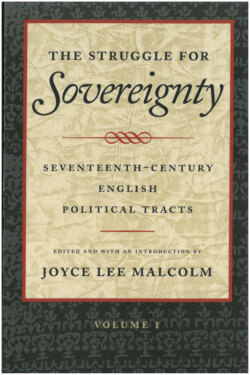Читать книгу The Struggle for Sovereignty - Группа авторов - Страница 17
На сайте Литреса книга снята с продажи.
ОглавлениеProhibitions del Roy,” printed in part 12 of Coke’s celebrated Reports, is one of the most cited of all Coke’s cases and of clear importance to the issue of sovereignty. King James had raised the question of the king’s right to decide cases in the court of King’s Bench. This pretension, Coke informs us, he tactfully denied, pointing out that while the law was based upon reason and his majesty was well endowed with that commodity, cases were not to be decided by natural reason “but by the artificial reason and judgment of Law”—an art that required many years to master. James then cautioned that this being so the king would be under the Law “which was Treason to affirm.” Coke deftly handled this crucial point in a famous response. He quoted the great medieval jurist Henry Bracton’s pronouncement that the king was under no man, but he was under God and the law.
Writs of prohibition had been used to remove cases from ecclesiastical and admiralty courts to the common law courts on the ground the former courts lacked proper jurisdiction to try them. Coke had angered the church by repeatedly using writs of prohibition against ecclesiastical courts. A prohibition del roy denies the king’s jurisdiction.
This case occurred in 1607 while Coke was James’s chief justice of the common pleas but was not published until 1656. The edition used here is that of 1658. The manuscript version of the twelfth part of the reports in which it appeared was among Coke’s papers seized by Charles I in 1634 upon Coke’s death. Seven years later, on the petition of the House of Commons, Charles returned the manuscripts to Coke’s heir, Sir Robert Coke. Coke’s planned twelfth volume of Reports was published during the Protectorate. The mistakes in several of the legal citations are doubtless due to the fact that the work was published by those less painstaking than the author.
